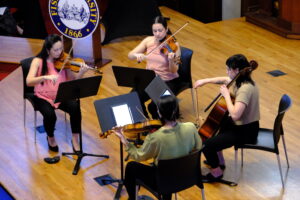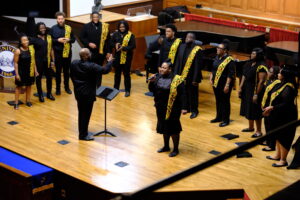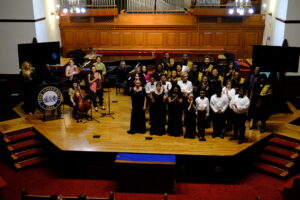At the Fisk Chapel
Upon These Shoulders: The Living Legacy
On April 4th, in Fisk’s historic Memorial Chapel, Intersection, Choral Arts Link, and the W. Crimm Singers (aka Wakanda Chorale) presented the their annual concert series Upon these Shoulders: The Living Legacy, celebrating “…the many heroes of the Civil Rights Movement, historically and today.” This space positively echoes with history. It was in this room nearly 70 years ago that Martin Luther King Jr. gave his “What is a Man” sermon, and also the campus where he returned to “…not to bring inspiration, but to gain inspiration from the great movement that has taken place in this community,” in celebration of the organization and resiliency of the movement here. This is to say nothing of the other figures in American history that have passed its over its threshold (e.g. Duke Ellington, Thurgood Marshall, Booker T. Washington, Louis Armstrong, W.C. Handy right on through Kamala Harris et al).

After a remarkable introduction by the charismatic Harriet Wallace, who announced the “threads” that would organize the evening, the performances by the Intersection quartet began with the first thread, three compositions from “…women who dared to lead.” These works synthesized, in different ways, folk and popular music styles within a classical framework. Rhiannon Giddens “At the Purchaser’s Option with Variations” for example, is an arrangement for quartet of one of Giddens’ masterworks in Americana. As Americana, the song is a frank discussion of a horrid context coupled with an effort to express the perspectives of those involved, here a powerful story of trial and resilience by a slave woman and/as mother. The arrangement for quartet was commissioned by the Kronos Quartet in 2017 and was played on Friday with great eloquence by Intersection’s ensemble. In particular, the first violinist Christina McGann engaged the rich, blue melody with a strong and beautiful vigor.
Charlton Singleton’s “Testimony,” another Kronos commission, takes as its influence the Gullah Ring Shout, especially the “Gullah Clap” and its later iteration in the Prayer Band. Here, cellist Kaitlyn Raitz’s melodic line against the other player’s stomp was remarkable, brimming with emotion. However, the best of the three, in my humble opinion, was Jessie Montgomery’s “Source Code.” A stirring dirge, the long-held notes and slow-moving harmonies seemed to make the walls of the old chapel sing in accompaniment. For all of its history, the Fisk Chapel might just be the best place in the city to hear chamber music (my ears were reminded of Rockport’s Shalin Liu Performance Center, way up north).
The next thread, “a crescendo of courage, echoing from trailblazers to the next generation” featured performances and a celebration of retired Professor Valija Mellins Bumbulis. Prof. Bumbulis, a graduate of the Chicago Conservatory of Music, had served on the faculty of Fisk University from 1974 to 2015, training Fisk Jubilee Singers and future alumni who would succeed in everything from successful opera careers to becoming finalists on American Idol. It is just wonderful that they are still celebrating her ten years into retirement.

In this thread, Elise Golden’s performance of Undine Smith Moore’s arrangement of “I want to die while you love me” and Kristen Jone’s performance of Florence Price’s arrangement of “You Won’t Find a Man Like Jesus” were both undertaken with a maturity, and clear, exacting intonation that demonstrated the strength of Fisk’s current vocal program—a better complement than anything else on the importance and enduring strength of Prof. Bumbulis’ career.
The W. Crimm Singers’ (“Wakanda Chorale”) performance made up the evening’s third thread, “…a celestial chorus, voices of past pioneers guiding tomorrow’s probes.” It also showcased arrangements by Florence Price and Undine Smith Moore. Florence Price has been often featured of late in mainstream classical music, however, Moore has her own remarkable story.
Born in 1904 and raised in Virginia, Moore studied at Fisk University where, in 1924, she was given a scholarship to also study at the Juilliard School. She would then receive a Masters of Arts from Columbia and study composition at the Manhattan School of Music. After a long and distinguished career serving students and composing at Virginia Union University, Fisk honored her with the Humanitarian award in 1973, and Indiana University granted her an honorary doctorate two years later. “Striving after God,” the arrangement performed on Friday was inspired by Moore’s study of baroque counterpoint and the poetry of Michelangelo; it synthesizes the styles of hymnody and gospel.

The Crimm Singers demonstrated what is becoming their legendary Nashville sound (surely the result of Director Patrick Dailey’s deft leadership) with a crisp aural blend and an exacting attention to detail as beautiful as their brightly colored kente cloth sashes. This thread ended with “Jesus is All the World to Me” with a soloist whose range was simply staggering. As we all caught our breath, Ms. Wallace found her way back to the microphone and exclaimed “I heard a little Mahalia come out!” (Mahlia Jackson’s husband Ike studied at Fisk University in the 30’s—historic circles abound in a place like Fisk).
The final thread was, surely, the best of the evening. Described as “The legacy lives on, where history’s chorus and the music of the cosmos unite in exploration,” it featured Director Nita Smith’s MET singers, a Nashville-based children’s choir that was founded by the indomitable Margaret Campbelle-Holman. As always, the singers had a surprising sound, a rich texture and remarkable poise—particularly the young soloist in Campbelle-Holman’s stirring arrangement of Work’s “Hallelu,” it was beautifully performed. Further, it is worth remarking the strength of the MET ensemble—not only do they teach an impeccable musical practice, but they also teach respect and leadership, whether it be standing up for what’s right or simply assisting someone stepping of the stage—let’s hope that these children become tomorrow’s leaders!
As all these threads found their way back onto the stage (including MET singer alumni) for the final number by the combined ensemble, “Lift Every Voice and Sing” I realized that after this beautiful concert I was inspired more than I have been in some time. In these days of division, anger, and hate, this was a gorgeous respite. In this way, I think I might have a better understanding of the inscription “Arise shine, for thy light is come…” that adorns the entrance to that great hall.



